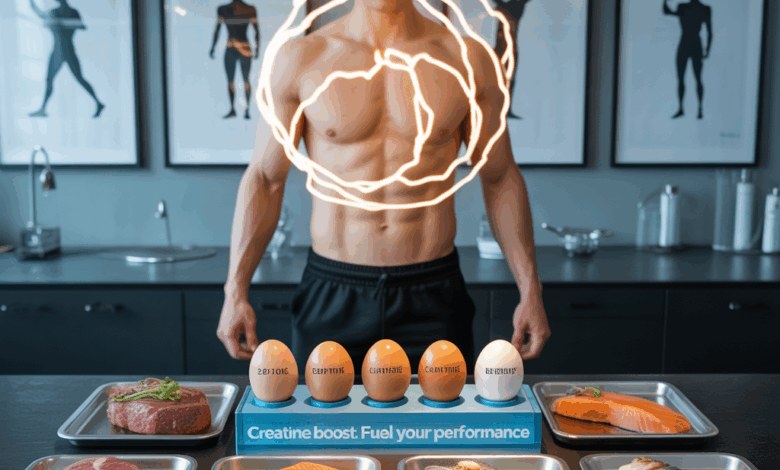How Much Creatine Is in Eggs Plus 5 High Creatine Foods to Boost Your Performance

Ever wondered why your gains stall even though you eat eggs every morning and train hard? What if a missing nutrient — not calories or protein — is the quiet limiter in your workouts? If you track macros but haven’t considered dietary creatine, this article will change how you think about food and performance.
Quick answer: how much creatine is in eggs (and why it matters)
Eggs are a fantastic source of high-quality protein, vitamins, and healthy fats, but they contain only trace amounts of creatine. A large egg provides roughly 0.03–0.05 grams (30–50 mg) of creatine — a negligible amount compared with red meat or certain fish. That means relying on eggs alone won’t meaningfully raise muscle creatine stores, which are closely tied to power, sprint performance, and short-burst strength.
Why creatine matters for athletes, lifters, and weekend warriors
Creatine helps regenerate ATP — the immediate energy currency during high-intensity efforts like sprints, heavy lifts, and explosive movements. Increased muscle creatine stores can improve strength, power, and recovery between sets. Whether you’re chasing a personal best deadlift or a faster 40-yard dash, dietary creatine and supplements are effective, well-researched tools.
Natural creatine vs. supplementation
While meat and fish supply dietary creatine, most research on performance uses supplemental creatine monohydrate at 3–5 grams per day. If you’re vegetarian or eat mostly eggs and dairy, supplementation is often the fastest way to increase intramuscular creatine.
5 high creatine foods to boost your performance
Here are five foods rich in creatine (approximate creatine per 100 g serving):
- Herring — ~1.0 g: One of the highest natural creatine sources. Great smoked or pan-seared.
- Beef — ~0.4–0.5 g: Lean cuts provide both creatine and abundant protein for recovery.
- Salmon — ~0.4 g: A heart-healthy fish that also contributes meaningful creatine.
- Tuna — ~0.3–0.4 g: Convenient canned or fresh for quick meals.
- Pork — ~0.3–0.6 g: Another solid source of dietary creatine for omnivores.
Note: values vary by cut and preparation. If you want to meaningfully increase muscle creatine through food alone, you’d need large portions daily — which is why supplementation is common practice among athletes.
Practical tips to use dietary creatine for better workouts
1. Combine creatine-rich meals with strength training
Plan beef or salmon dinners on heavy lifting days. Creatine boosts are most useful when paired with sessions that stress the ATP-PCr system: heavy squats, deadlifts, cleans, sprints, and plyometrics.
2. Example workout variations
- Strength focus (3x/week): 4–6 sets of 3–6 reps at 80–90% 1RM (squat/bench/deadlift). Rest 2–4 minutes between sets.
- Power/metro session: 6 rounds of 10-second sprints with 90–120 seconds rest — creatine improves repeat-sprint ability.
- Contrast training: Pair heavy lift (3 reps) with explosive movement (6 reps of jump squat) to amplify neural and power adaptations.
3. Timing and dose recommendations
If you choose supplementation, a common protocol is 3–5 g/day of creatine monohydrate. A loading phase (20 g/day split for 5–7 days) saturates muscles faster but isn’t required. Take with carbs or a mixed meal for convenience; consistency matters more than exact timing.
4. Hydration, sleep, and protein
Creatine pulls water into muscle cells, so keep hydration up. Aim for 7–9 hours of sleep and 1.6–2.2 g/kg protein per day to pair with creatine for optimal gains and recovery.
Real-world example: a day of eating for performance
Breakfast: Omelet with spinach and smoked salmon (adds creatine and omega-3s). Lunch: Tuna salad on whole-grain bread. Pre-workout: small banana and coffee. Post-workout: beef stir-fry with rice and vegetables. This approach blends creatine-containing foods with adequate carbs and protein for training quality and recovery.
How much creatine is in eggs plus 5 high creatine foods to boost your performance — summary
To restate: eggs contain only trace creatine (~0.03–0.05 g per large egg), so if your diet relies heavily on eggs and plant foods, your dietary creatine intake will be low. Incorporate high-creatine foods like herring, beef, salmon, tuna, and pork to raise intake, or consider a 3–5 g/day supplement to reliably saturate muscle stores and improve strength, power, and repeat-sprint performance.
Frequently Asked Questions
A large egg contains roughly 0.03–0.05 grams (30–50 mg) of creatine — a tiny amount compared to meat and fish. Eggs are still valuable for protein and other nutrients but are not a significant creatine source.
It’s possible if you consistently eat large servings of creatine-rich meats and fish (e.g., herring, beef, salmon). However, most people find supplementation (3–5 g/day) is a convenient and inexpensive way to ensure consistent muscle creatine saturation.
Yes — creatine monohydrate is well-studied and considered safe for healthy adults at recommended doses. Stay hydrated and consult a healthcare provider if you have kidney disease or other health concerns.
Conclusion — take control of your performance
If you’ve been counting eggs as your creatine source, now you know the truth: eggs are great, but they don’t supply enough creatine to meaningfully boost power or sprint performance. How much creatine is in eggs plus 5 high creatine foods to boost your performance? Eggs contribute tiny amounts; herring, beef, salmon, tuna, and pork are the foods that move the needle. Combine these foods (or a daily 3–5 g creatine supplement) with targeted strength and interval training, good sleep, and hydration to see measurable improvements.
Ready to apply this? Try adding a salmon or beef meal on heavy-lift days this week, track your training performance, and consider supplementing if you’re vegetarian or need faster results. For tailored plans, check our workout routines and nutrition guides, and browse wellness tips to optimize recovery. Share your results — I’d love to hear how your power and sprints improve.
For more high protein dinner ideas, check out High Protein Dinners.
For more high protein dinner ideas, check out High Protein Dinners.





